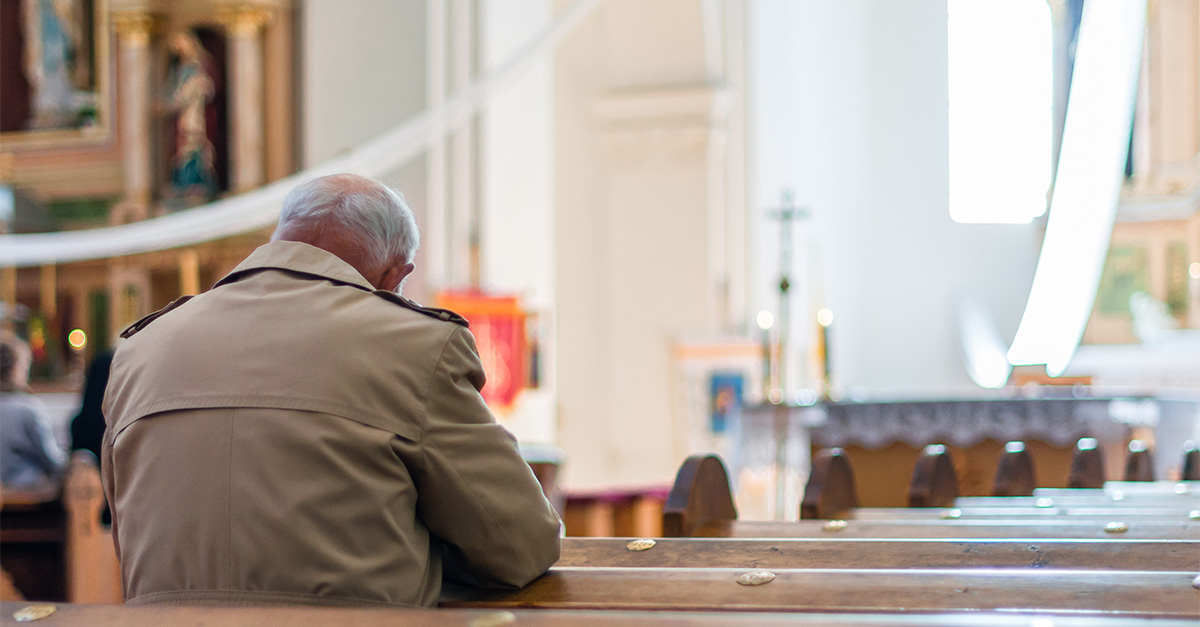


Get a free copy of Parental Rights & Education when you subscribe to our newsletter!

“If the local church is meant to be the primary, formative institution around which we order our lives as Christians, then once you have found a good one, you should plan to stay for as long as you can.”
@William_E_Wolfe
Do you want to be a rebel in our society today? Do you want to be radical, I mean, really radical? Because let’s be honest, there is nothing radical about marching in a rally for some social justice cause that literally every major corporation in America supports. If Instagram, Tik Tok, and Twitter are promoting your cause to their billions of combined users, well friends, you are certainly not raging against the machine.
No, I’ll tell you what really goes against the warp and woof of our aggressively autonomous and anti-institutional age: joining a local church. It’s radical — otherworldly — to willingly submit yourself to another body of local believers, committing to membership and discipline, as outlined in Matthew 18. It might be radical, but it’s completely worth it.
Remember, the Christian life is the church life and the church life is the Christian life. So let me encourage you to be a rebel with a cause by joining a church. But you need to take it one step further. Join a church and then plan (more or less) to never leave it. The first step is relatively easy; the latter is much harder. How do you do it? By striving to make it as painful as possible to leave your church if God should ever call you onward. You do it by aiming at hard church goodbyes.
Speaking of hard goodbyes, I recently underwent the unpleasant process of ripping off the Band-Aid of a decade’s worth of relationships and attachment to my own local church. The stinging pain of that moment focused my reflections on the importance of ordering the Christian — the churched — life in such a way as to make it hard to leave your community if indeed the Lord calls you to move on. And it struck me that this is, in so many ways, the polar opposite of how our individualistic, easy-come, easy-go, Irish-goodbye-bent culture treats community and relationships.
“So…how do you say goodbye after ten years?” quipped one of my good friends — a pastor at my previous church — as we stood in the parking lot, preparing to go inside for the Sunday evening prayer service. While he said it in a lighthearted manner, the question hit me like a ton of bricks. Why? Because in just a few short moments, my wife and I would stand up in front of the congregation, look out on the faces of our friends and spiritual family for the last decade and do just that: say goodbye. It was particularly bittersweet for me, as I had come to faith through the witness of the senior pastor. I had been baptized at this church and, thus far, lived my entire Christian life within its four walls. My wife had a similar but slightly different story. She came to the church as part of a college ministry team shortly after graduation in what was now not even the past decade, but actually the one before that. This place was home in all senses of the word.
Now, we were leaving, saying goodbye. Thankfully, we were saying goodbye on good terms — the best of terms — as we prepared to move to Louisville, Kentucky, for me to finish seminary. And yet, it was still hard. Really hard. So how did we say goodbye? By smiling through the tears. By praising God for the work He had done in our lives through the local church. And by thanking the many, faithful friends who had been by our sides every step of the way over the last 10 years. Friends who were there when we first met, who watched us grow up, physically and spiritually, cheered on our engagement, stood up at the altar when we got married, brought us meals when had our first two kids, and counseled us during rough patches in our marriage; these were friends and family who shared all the highs and lows of a decade of life. As one brother put it: “You were a big part of my life this past decade. And one doesn’t get too many decades in life!”
Upon further reflection, I realized that if I had taken more time to not just thank our church family and faithful friends but to also encourage them, I would have shared three specific pieces of advice with the congregation, three thoughts on how to aim at long-term membership in a transient culture and an anti-institutional age.
I pray that these are useful for you regardless of what age or stage of life and church membership you find yourself in. How can you make it hard to say goodbye? Three steps: 1) Plan to stay, 2) Plant roots, and 3) Pour into others.
(The rest of this post will cover the first point — Plan to Stay — and Part 2 will cover the rest.)
Seriously, simply plan not to leave. Join a church. Settle in. Stay put. I trust that you’ve picked up on that point already, as I have been making it with all the subtlety of the Israelites circling Jericho. Make a plan — a plan to do nothing but remain unchanging in your church membership. To slightly spiritualize an Old Testament passage that definitely doesn’t apply directly to us today, but is nonetheless illustrative of what I mean, consider how the Israelites made camp after God led them out of Egypt. In Exodus 40:36-37, we are told that, “In all the travels of the Israelites, whenever the cloud lifted from above the tabernacle, they would set out; but if the cloud did not lift, they did not set out.”
What if, instead of operating on a two-, or three-, or even five-year plan somewhere, you kick that timeline out “indefinitely,” and assume the cloud is going to stay put? In other words, if you are a member of a local church, one that preaches the true Gospel, practices meaningful membership and discipline, and encourages you in your discipleship and evangelism, plan to build your life around it as much as you can and for as long as you can. Plan…but plan to stay.
What does this look like? How can you “plan” to stay put? It means that when it comes time to change jobs, you look locally first. It means that if offered a promotion that pulls you away from your home, your first instinct isn’t to jump on it but to consider whether passing it up for the sake of further investment in your church family is of greater spiritual worth. It may mean budgeting in such a way as to enable you to purchase a home in a pricier area than you prefer, perhaps by passing up on the “epic vacations” all your friends take or by hanging on to your current car or slightly dated device. Or, on the flip side, it may mean taking the risk to buy a home in an underdeveloped, poor, or high-crime area as part of a long-term investment in the community. Ultimately, it looks like a life lived with the interests of others (Philippians 2:4) squarely above your own.
Now, along with my recent transition, there was something else that served to surface this line of reflection. It was the memory of a certain conversation I had with more than a few fellow church members; it was a similar conversation each time, though with a different face sitting across the table, and it was now echoing in the back of my brain as I adjusted the rearview mirror and put the swamp behind me. Over the years I spent hunkered down in D.C., a fast-paced city with a transient population, I saw quite a few people come and go. On the surface, it makes sense: Elections regularly reshuffle the landscape, home prices are high, raising a family in the city can be tough, etc. The incentives to breeze in and out of an urban environment in three- to-five years are many and multiplying. The membership at my previous church was not immune to these forces of change, the ones that brought people in and then pulled them back out, in what so often seemed to feel like mere momentary lapses of time.
But in the midst of the moving landscape of memories, I remembered this one conversation that I often had with younger brothers and sisters in Christ. Inevitably, or so it seemed, after just a few years in the city and at our church, they often began to wonder, and ask, “What’s next?” Maybe you have even asked this question as well in your own church context. What do you tell yourself? What did I tell them? Here’s what I would say now: “What if nothing is next? What if you just stick around and see what happens?”
I recognize this is a deeply countercultural way to structure your life. Modern society tells us to focus on our career aspirations above all else, to follow the path of personal fulfillment wherever it takes us, and to move along whenever it beckons. But if the local church is meant to be the primary, formative institution around which we order our lives as Christians, then once you have found a good one, you should plan to stay for as long as you can. When you get that itch for something new just for the sake of something new, confess it to a trusted brother or sister in Christ. Pray for endurance and long-suffering. Don’t be like Toad in the beloved children’s series “Frog and Toad,” who, when planting a garden, demanded instant results:
Toad ran home. He planted the flower seeds.
“Now seeds,” said Toad, “start growing.“
Toad walked up and down a few times.
The seeds did not start to grow.
Toad put his head close to the ground and said loudly, “Now seeds, start growing!”
The seeds did not start to grow.
Toad put his head very close to the ground and shouted, “NOW SEEDS, START GROWING!“
Don’t shout at the seeds of your personal growth — or at the seeds of any of your other spiritual plantings. Don’t be so quick to cut and run when you don’t see results or when the desire for novelty starts to feel like it’s outweighing the value of plodding persistence. Remember, the Christian life is one long, slow path of obedience, always heading in the same direction. And when possible, it’s a trip best taken alongside the same group of pilgrims for as many miles as you can cover together. So, be patient and stay put. Pray and watch how God might use your presence, multiplied by the factor of faithfulness over time, in ways you could never imagine.

A 10-year veteran of the conservative political movement, William Wolfe served as a senior official in the Trump Administration, both at the Pentagon and the Department of State. Prior to his service in the administration, he worked for Heritage Action for America and as a congressional staffer for three members of Congress, including the former Rep. Dave Brat. He has a B.A. in History from Covenant College and is currently finishing his Master of Divinity at The Southern Baptist Theological Seminary.
Christian conservative news and issues that matter. Curated just for you!
